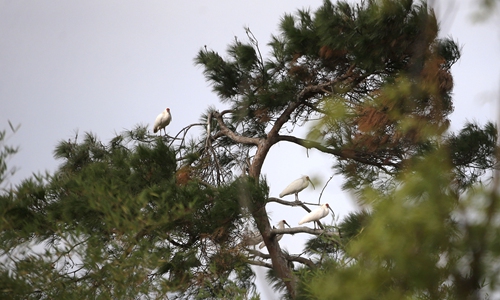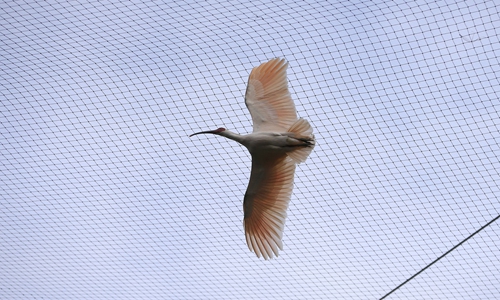
From the People's Daily App.
This is Story in the Story.
China made a miracle in saving and protecting giant pandas from the verge of extinction, and now the miracle is repeated for the crested ibis, which is also known as an auspicious "fairy bird" or "beauty bird" in Asian culture.
The species is still endangered, but its revival is a conservation success in China, in which Qiu Guoqiang, an expert on the crested ibis, plays his role in East China's Zhejiang Province.
The crested ibis is believed to have existed for 60 million years and commonly settled in China, the Korean Peninsula, Japan and Russia until the 1960s. Bird conservationists attribute pesticides, fertilizers, hunting, environmental and ecological reasons for bringing the birds to the brink of extinction.
Since the crested ibis became extinct on the Korean Peninsula and in Russia in the 1970s, the last spotted six crested ibises in Japan were believed to be the last group of the species on earth, and the Japanese government decided to put them in captivity in 1981 for better protection.
Yet the controversial practice turned out to be a failure, as the birds didn't survive. The last one died in 2003, signifying the extinction of the species in Japan.
Today’s Story in the Story looks at efforts in China to bring the fairy bird back from the brink of extinction.

Wild crested ibises are spotted on a tree in Deqing, East China's Zhejiang Province. (Photo: Global Times)
A Chinese scientist, Liu Yinzeng, then a researcher at the Chinese Academy of Sciences (CAS), didn't accept that crested ibises were extinct in China. He led a team in 1978 to search for the bird throughout China.
The turning point came in May 1981 after Liu and his team had climbed over mountains in nine provinces. Two adult crested ibises were spotted in Yangxian county in Northwest China's Shaanxi Province. The CAS website indicates that a week later, two more adult crested ibises with three newborn chicks were found in the same area.
Following the discovery of these seven birds, China launched a conservational approach to protect and preserve the crested ibis. As a result, there are now more than 3,500 crested ibises living in both the wild and captivity in China.
Among the crested ibis population in China, 406 are in Deqing county in Zhejiang Province, which is more than 1,500 kilometers away from Yangxian county. There are 284 crested ibises living in captivity and 122 of the birds are living in the wild in Deqing.
Qiu Guoqiang, the 50-year-old director of the Deqing Rare and Precious Animals Breeding Research Center, is the man who helped make the beautiful birds part of the eye-catching scenery in Deqing.

A crested ibis is trained to re-enter the wild in the Deqing Rare and Precious Animals Breeding Research Center, East China's Zhejiang Province. (Photo: Global Times)
Liu Yinzeng is recognized as the father of crested ibises in China, while Qiu is nicknamed as the "father of crested ibises in Zhejiang."
"My dream is that crested ibises from Deqing can help establish the bird species in the Jiangnan region, or rather the entire Yangtze River Delta region," Qiu said.
Zhejiang introduced five pairs of crested ibises from Shaanxi in 2008. The five males and five females parented 35 chicks until 2010 when 10 birds bred in Japan were returned to China and sent to Zhejiang. In 2012 eight more were sent to Zhejiang from Japan. Beijing Zoo also gave four crested ibises to Zhejiang.
"The introduction of new birds was very important to improve the quality of genes of the species. Like human beings, inbreeding among birds is not good for the quality of the species, which can result in low fertilization rates and a higher chance for birth defects to occur. Furthermore, when the chicks grow up, their flying ability may also be affected, which will lead to a low survival rate in the wild," Qiu said.
Qiu has led a 10-member administrative team of wetland and wild botany preservation in Deqing since 2014 and is also in charge of the Rare and Precious Animals Breeding Research Center at the Xiazhu Lake Wetland Park in Zhejiang.
Rebuilding the crested ibis species is the top priority on Qiu's agenda.
(Produced by Nancy Yan Xu, Brian Lowe, Lance Crayon and Paris Yelu Xu. Music by: bensound.com. Text from Global Times.)


